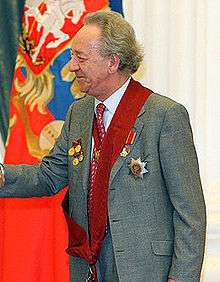Saint Petersburg Philharmonic Orchestra
The Saint Petersburg Philharmonic Orchestra was formed in 1882, and is Russia's oldest symphony orchestra.[1][2]
The Saint Petersburg Philharmonic Orchestra was initially known as the Imperial Music Choir, and performed for the Court of Alexander III of Russia. By the 1900s, the Orchestra started to give public performances at the Philharmonia and elsewhere in Russia.
After the Russian Revolution, the Orchestra was taken over by the members, and the name was changed to the State Philharmonic Orchestra of Petrograd. In the 1920's, the Orchestra began receiving support from the State, and began to be known internationally. Guest conductor appearances were made by Bruno Walter, Ernest Ansermet, and Hans Knappertsbusch during this time. The city of Petrograd was renamed Leningrad three days after the death of Vladimir Lenin, the founder of the Soviet Union. Around this time, the Orchestra was renamed the Leningrad Philharmonic Orchestra.
The Orchestra gained its most fame under the lengthy directorship of Yevgeny Mravinsky. The orchestra made few tours to the West, and the first tour was to Finland in the Spring of 1946; however, also they made a number of studio and live recordings under Mravinsky. Under Mravinsky's direction, the Orchestra premiered seven of Shostakovich's Symphonies.
In 1991, the Orchestra was renamed the Saint Petersburg Philharmonic Orchestra. Today, the Orchestra is an internationally recognized, and the Chief Conductor is Yuri Temirkanov.
Chief conductors

- Hermann Fliege (1882–1907)
- Hugo Varlikh (1907–1917)
- Serge Koussevitzky (1917–1920)
- Emil Cooper (1920–1923)
- Valery Berdyaev (1924–1926)
- Nikolai Malko (1926–1930)
- Aleksandr Gauk (1930–1934)
- Fritz Stiedry (1934–1937)
- Yevgeny Mravinsky (1938–1988)
- Yuri Temirkanov (1988–)
See also
References
- ↑ "The Saint Petersburg Philharmonic Orchestra, Russia". Saint Petersburg Philharmonic Orchestra, Russia. 12 April 2017. Retrieved 12 April 2017.
- ↑ "Saint Petersburg Philharmonic Orchestra, Russia, Performances". YouTube.com. 12 April 2017. Retrieved 12 April 2017.
- Leningrad Philharmonic Orchestra, discography at Naxos Records
External links
- The official page of the Saint Petersburg Philharmonic Orchestra
- Dettmer, Roger. St. Petersburg Philharmonic Orchestra at AllMusic
- Article at Bach-Cantatas.com